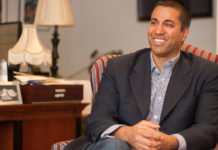President Trump’s Federal Communications Commission chairman, Ajit Pai, is being continuously harassed by liberal protestors, reportedly over his attempts to reverse the net-neutrality policies which were given a go-ahead by the Obama administration.
According to the Wall Street Journal, activists belonging to the liberal group, Popular Resisitance, have started gathering outside Pai’s home in Arlington, Virginia. However, they’re not just standing outside his home to show their displeasure with the new administration’s policies. Protestors have begun going up to Pai’s home’s windows and are reportedly taking pictures of the interior. Pai lives in his Arlington home with his wife and two children.
“They were there yesterday. I understand they’ll be there today. They’ll be there tomorrow and the day after,” Pai told the Wall Street Journal.
“It’s a hassle, especially for my wife and my two young children,” the he said.
Pai further added that some of the protesters “come up to our front windows and take photographs of the inside of the house. My kids are 5 and 3.”
“It’s not pleasant,” the FCC chairman acknowledged.
In AJit Pai’s neighbourhood in Arlington, activists have also distributed flyers asking other residents if they’ve seen Pai. The flyers describe Pai; giving his age, weight, and height, and claim that he’s “trying to destroy net neutrality.”
While most call this clear harassment, activist outside Pai’s home call it “Ajit-ation.”
In a straight party line vote in February 2015, FCC commissioners approved net neutrality rules that were intended to ban broadband service providers from throttling, blocking, or prioritizing certain content over others.
Three Democrats, including Tom Wheeler, the then-FCC chairman, voted in favor of the new rules, while tow Republicans, including Pai opposed the measure. At that time, Pai called the net-neutrality rules a “monumental shift toward government control of the Internet” and a “rapid departure” from market-oriented approaches.
However, Wheeler argued back, saying net neutrality would go on to make America even “more competitive.” He further said that it would “assure the rights of Internet users to go where they want, when they want.”
Wheeler also said it would secure the “rights of innovators to introduce new products without asking anyone’s permission.”






























